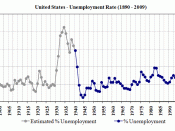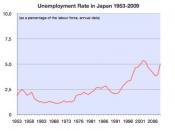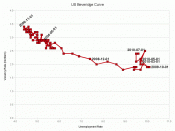Unemployment and Economics
Unemployment has always been a problem in society where money, and therefore a source of money, are essential for survival. Those individuals who are not able to find work are left without resources and capital with which they can support themselves or a family. Unemployment acts as a negative influence on the economy as it displays a lack of productivity. However, it cannot be avoided. Some forms of unemployment will always exist, even in the most productive society, and the system today actually encourages some people to remain unemployed. Desires to increase productivity, numbers of jobs, and number of people working do not always translate into lowering the unemployment rate. In this paper I will try to explain what this unemployment rate is and how forces in the economy affect it.
A "simple" ratio is used to define the unemployment rate. The ratio is simple, but the set-up is not.
Let the total population be the number of people sixteen years or older. Anyone who does not have a job and does not want one (is not actively searching) is not considered to be a part of the labor force. The rest of the "population" is then considered the labor force, which consists of people working, and people not working but looking. The unemployment rate is set equal to the number of people unemployed and seeking work divided by the total work force. This leaves some significant gaps when trying to paint a picture of the labor situation.
First of all, those people who have given up looking due to frustration but are capable of working are not considered part of the labor force, and are given the term "disgruntled workers". The number of disgruntled workers is not measurable in the unemployment rate, and each searching worker...


